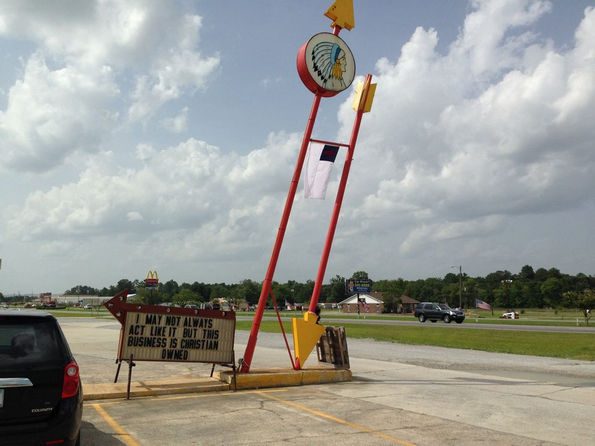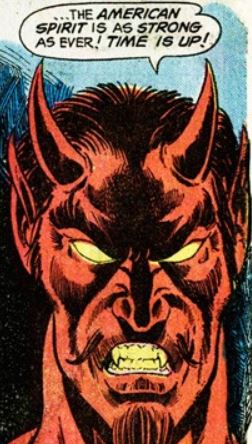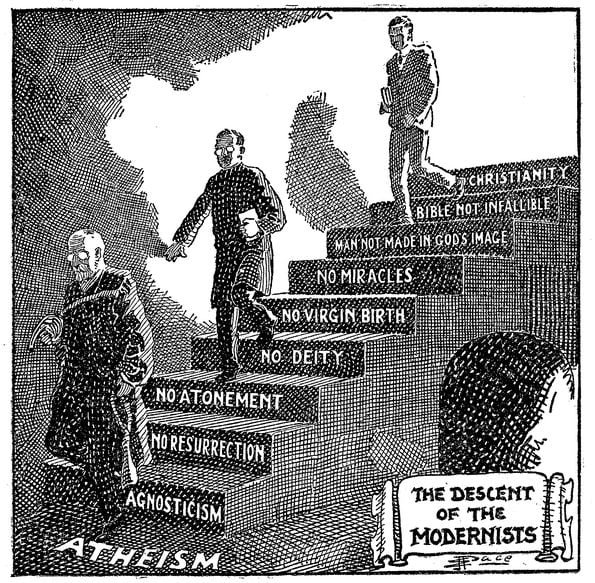Last month, the U.S. Supreme Court legalized same-sex-marriage, handing Evangelical culture warriors a bitter defeat. Unless they can figure out how to remove several Supreme Court justices or amend the U.S. Constitution, Evangelicals must live with the fact that same-sex marriage is legal.
The culture war pits Evangelicalism, along with Mormonism and conservative Catholicism, against any societal ill considered by Evangelicals to be a sin against God or a move away from Christian nationalism. Now that they have lost the homosexual/same-sex marriage battle, Evangelicals must find another enemy to fight against. According to Think Progress writer Jack Jenkins, the new enemy is liberal/progressive Christianity: (link no longer active)
For decades, conservative Christians who oppose LGBT equality have singled out the federal government or secular atheists as their preferred enemy in public settings, blasting both groups for supposedly attacking “traditional marriage” or infringing on their religious liberty. Yet in the months surrounding the recent U.S. Supreme Court decision to legalize same-sex marriage across the country, right-wing Christians have become increasingly willing to cast blame — seemingly hypocritically — on a group they have often dismissed or outright ignored: Progressive Christians, especially those who support marriage equality.
The first hints of a growing front against liberal Christians came in May, when a coalition of conservative churches in Fountain Hills, Arizona publicly ganged up on a local progressive Methodist community. Unhappy with the church’s teachings, eight congregations launched a campaign entitled “Progressive Christianity: Fact or Fiction?,” a coordinated teaching and preaching series that included op-eds, a half-page advertisement in a local newspaper, and a massive banner with “progressive” written in jagged red letters and hemmed in quotation marks.
“The progressives are at it again, and for a small fee you can join the primary proponent of this apostate religious movement to get answers,” Tony Pierce, a pastor of First Baptist Church of Fountain Hills and one of the participants in the effort, wrote in a letter to the editor. “The good thing about the progressive movement is it gives people a clear choice. The ironic thing about progressive Christianity is that it is neither!”
The source of their outrage? Rev. David Felten, the left-leaning pastor of Fountains United Methodist Church. He reportedly stoked ire by preaching a variety of progressive concepts to his parishioners, such as theological support for interfaith dialogue, scientific discovery, and, of course, LGBT equality.
Felten, like many progressive Christians, was used to criticism for his views — he has even published a book about progressive Christianity. But the intensity of the local attack — which included churches from denominations that are generally more liberal than his own United Methodist Church — caught him off guard.
This same sentiment reemerged in June in the aftermath of the Supreme Court’s ruling in favor of marriage equality in Obergefell v. Hodges, which was gleefully celebrated by a host of progressive faith groups. Just a few days after the decision, Kevin DeYoung, a pastor in East Lansing, Michigan, published a blog post at the Gospel Coalition entitled “40 Questions For Christians Now Waving Rainbow Flags” that quickFor decades, conservative Christians who oppose LGBT equality have singled out the federal government or secular atheists as their preferred enemy in public settings, blasting both groups for supposedly attacking “traditional marriage” or infringing on their religious liberty. Yet in the months surrounding the recent U.S. Supreme Court decision to legalize same-sex marriage across the country, right-wing Christians have become increasingly willing to cast blame — seemingly hypocritically — on a group they have often dismissed or outright ignored: Progressive Christians, especially those who support marriage equality.
The first hints of a growing front against liberal Christians came in May, when a coalition of conservative churches in Fountain Hills, Arizona publicly ganged up on a local progressive Methodist community. Unhappy with the church’s teachings, eight congregations launched a campaign entitled “Progressive Christianity: Fact or Fiction?,” a coordinated teaching and preaching series that included op-eds, a half-page advertisement in a local newspaper, and a massive banner with “progressive” written in jagged red letters and hemmed in quotation marks.
“The progressives are at it again, and for a small fee you can join the primary proponent of this apostate religious movement to get answers,” Tony Pierce, a pastor of First Baptist Church of Fountain Hills and one of the participants in the effort, wrote in a letter to the editor. “The good thing about the progressive movement is it gives people a clear choice. The ironic thing about progressive Christianity is that it is neither!”
The source of their outrage? Rev. David Felten, the left-leaning pastor of Fountains United Methodist Church. He reportedly stoked ire by preaching a variety of progressive concepts to his parishioners, such as theological support for interfaith dialogue, scientific discovery, and, of course, LGBT equality.
Felten, like many progressive Christians, was used to criticism for his views — he has even published a book about progressive Christianity. But the intensity of the local attack — which included churches from denominations that are generally more liberal than his own United Methodist Church — caught him off guard.
This same sentiment reemerged in June in the aftermath of the Supreme Court’s ruling in favor of marriage equality in Obergefell v. Hodges, which was gleefully celebrated by a host of progressive faith groups. Just a few days after the decision, Kevin DeYoung, a pastor in East Lansing, Michigan, published a blog post at the Gospel Coalition entitled “40 Questions For Christians Now Waving Rainbow Flags” that quicly spread through conservative and progressive Christian circles. Many of the inquiries were phrased in an accusatory manner, harping on old tropes that LGBT parents harm children and that supporters of marriage equality also support polygamy: “Do you think children do best with a mother and a father?” question 14 asked, followed by, “Do you think close family members should be allowed to get married?” and “On what basis, if any, would you prevent consenting adults of any relation and of any number from getting married?”
The post launched a heated war of words between progressive and conservative Christians, including LGBT evangelical Protestants such as Matthew Vines, who published his own list of 40 counter-questions in response. It, predictably, triggered spirited retorts from traditionalist conservatives.
But while DeYoung’s post was at least framed as an attempt at theological dialogue, other subsequent critiques of progressive faith have abandoned conversation for castigation. In mid-July, Peter Leithart, a Reformed theologian and head of the right-leaning Theopolis Institute, penned a piece in First Things that bemoaned the Court’s decision and explicitly asked conservatives to condemn LGBT-affirming Christians.
“Most important is what happens in the churches,” Leithart writes. “Even before Obergefell, some churches were making peace with same-sex marriage. Now that same-sex marriage is law, the tribe of ‘Good Churches’ will increase, and the division in the churches over sexual morality will sharpen. Many leaders, churches, and denominations have condemned the Court’s decision, and more will; but others support it, and we have no trans-denominational mechanism to adjudicate between them.”
Saying what’s right is necessary, but it’s not enough. Pastors need to be willing to say that other churches [that support marriage equality] are wrong, and dangerously so.”
Granted, conservative Christian denunciation of people who hold different beliefs than they do isn’t exactly a new phenomenon. Organizations such as the Institute on Religion and Democracy, which has spent years lobbying against LGBT equality from within several Christian denominations, have long sought the eradication of liberal theology. Right-leaning Catholics and evangelical Christian leaders such as Franklin Graham have repeatedly made sweeping claims as to what “Christians” believe, implying that people of faith who don’t share their views are not, in fact, Christians. What’s more, faith communities — conservative or otherwise — have lashed out at each other almost since their inception, so it’s not necessarily surprising that conservative Christians, having lost legal battles over LGBT issues, are now sliding into a theological debate with fellow believers.
Yet the newest push against liberal Christianity appears hypocritical, as it coincides with a massive campaign waged by various right-wing Christians to insist that the political left respect their “religious liberty” — namely, the right to deny jobs and services to LGBT people in the public sphere, private business, and in Christian schools by invoking faith. Within hours of the Supreme Court ruling on same-sex marriage, Andrew Walker, Director of Policy Studies at the Ethics and Religious Liberty Commission of the Southern Baptist Convention, began insisting that the decision will only lead to the erosion of religious liberty — for evangelical Christians.
“Slowly and surely, Americans are now witnessing a slow erosion of religious liberty happening in the public square,” he wrote. “From backlash at expressing a belief about marriage that results in dismissal, to the real fear that institutions that desire to maintain accreditation may not be able to do so, the concerns registered in the past are being catapulted into the present.”…
You can read the entire article here. (link no longer active)




 Tim Wildmon, president of
Tim Wildmon, president of 